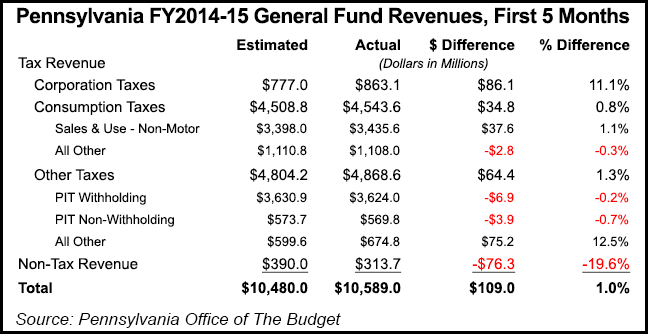Marcellus | E&P | NGI All News Access | NGI The Weekly Gas Market Report | Utica Shale
Without NatGas Severance Tax, No State Budget, Pennsylvania’s Wolf Indicates
Nearly three months into Pennsylvania’s state budget impasse Democratic Gov. Tom Wolf and Republican lawmakers are at loggerheads, with no agreement even remotely close as negotiations over a natural gas severance tax, education and other reforms appeared to breakdown on Wednesday.

Almost 80 days into the fiscal year, the state remains without a budget. Another day of negotiations on Wednesday ended with both Wolf and Republican leaders calling impromptu press conferences at the state capital, Harrisburg, to defend their stance on the gridlock. Wolf, a longtime businessman and first-time politician who took office in January on a campaign promise to raise taxes on the state’s oil and gas industry, appeared agitated on Wednesday, criticizing Republican lawmakers and calling the state of negotiations “beyond pathetic.”
“Never in my life — and I’ve been in negotiations throughout my adult life — have I ever been in negotiations like this,” he told reporters. “I put on the table historic reforms on pensions and liquor — pensions and liquor — two things that [Republicans] say are very important to them.
“…I put that on the table today and what did I get in return? Nothing,” he said. “I got nothing on severance tax, nothing. I got nothing on education, nothing. I got nothing on property tax relief, and I got nothing — I got nothing on how we’re actually going to balance this budget.”
A budget is supposed to be passed by July 1 under state law. But on June 30, Wolf vetoed a $30.1 billion budget crafted by Republicans (see Shale Daily, July 1). It did not include a severance tax or any new taxes or tax increases, which Wolf had called for to address a more than $2 billion budget deficit and the state’s ailing public education system.
Wolf’s budget proposal relied heavily on major tax reforms, including a 5% oil and gas severance tax and a 4.7 cent/Mcf volumetric fee that his administration estimated could eventually generate up to $1 billion — most of which would go toward public education (see Shale Daily, Feb. 11). He also proposed combined tax increases of roughly 16% mainly by raising consumption taxes.
During early budget negotiations, Republicans had indicated that they might consider a severance tax in exchange for privatizing the state-owned liquor system and reforming the state’s underfunded pension system for public school employees and state workers (see Shale Daily, Jan. 16). On Wednesday, Wolf said he offered to lease the state’s hundreds of liquor stores to a private manager that would allow Pennsylvania to retain ownership. He also offered pension reform that would include defined contribution plans such as a 401(k) for certain state employees.
He suggested, however, that Republican leaders would not budge on including a severance tax. Republican representatives, though, said leadership was reviewing Wolf’s proposals and noted that the governor had taken a month to respond to their previous proposal to generate education funding with pension reforms.
“The governor wants the people of Pennsylvania to believe that we won’t agree to a severance tax for more money for education, when in reality his proposal doesn’t even dedicate the revenue from a severance tax to education spending,” said Republican Sen. Scott Wagner of Southeast Pennsylvania. “Rather, he would fund the special interests in the alternative energy industry before a penny of new money would get to schools.”
Wolf has said the “lion’s share” of any severance tax revenue under his plan would go toward education. The rest, he said, would go toward the state Department of Environmental Protection, alternative energy development and local communities where most natural gas drilling occurs. Currently, the state charges an impact fee or a flat rate for all unconventional wells in the state each year, no matter how much gas is produced. The impact fee has generated nearly $856 million since it was passed in 2012 (see Shale Daily, June 11). That revenue is allocated to local communities and state agencies, but if a severance tax is passed, the impact fee would be eliminated.
As social service providers, school districts and others are caught in the middle of the budget stalemate with no state funding, Republicans in the general assembly have already started working to pass a stop-gap budget. Wolf, however, has said he would veto any temporary alternative to a final budget.
© 2024 Natural Gas Intelligence. All rights reserved.
ISSN © 2577-9877 | ISSN © 1532-1266 | ISSN © 2158-8023 |
